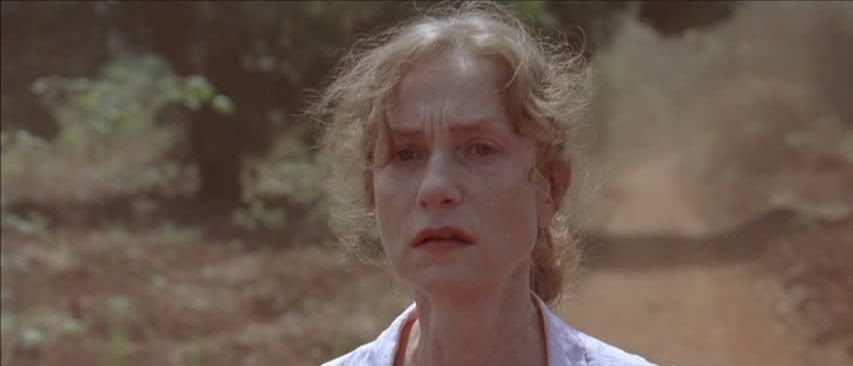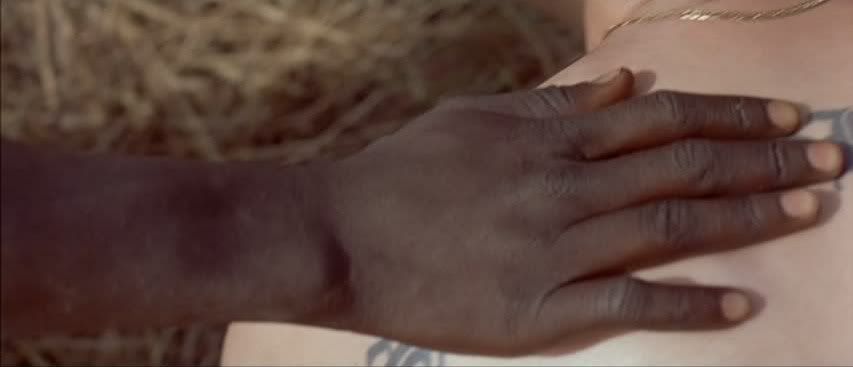
In White Material, Claire Denis returns to colonial Africa, the site of her debut feature Chocolat and her sensual masterpiece Beau Travail. Building upon the foundation of those earlier visits to the continent, White Material is dark and strange, overflowing with violence and foreboding. It's also much more abstracted than Chocolat's grounding in colonial Cameroon: this film's setting is an unnamed African country on the brink of post-colonial chaos, with French rule being replaced by a simmering war between the new, corrupt African government and the rebels roaming the country armed with rifles and machetes, blocking off roads and seizing whatever they can from the few whites who haven't already fled. The film is an allegorical fever dream of war and disintegration, the bitter fruit of years of colonial rule and post-colonial breakdown.
Early on, the plantation manager Maria Vial (Isabelle Huppert) sees a French military helicopter circling her land, warning her by megaphone that she should flee, that the French are pulling out and she won't be safe. They leave behind a land wracked by poverty, brimming with hostility. The French who formerly held all the land and all the wealth have seemingly transferred their privilege to a new government, who either accepted it as a gift from the fleeing colonizers or seized it in the process of evicting their former overlords. The people still have very little, they are poor and frightened, surrounded everywhere by war and rebellion and hatred when all they really want is to go on living their lives and providing for their families.
In her own way, at a grander scale, that's all Maria wants as well. She is fabulously privileged, with a large coffee plantation and a nice, spacious home, but she too only wants to protect her family, to protect what she sees as hers, to go on with life as she knows it even after it becomes obvious that things are changing, becoming too unstable, for the old ways to hold on any longer. Maria represents the "white material" that serves as a code word for the contempt of the blacks for their former masters. The "white material" is the things owned by the whites, but also their skin itself, a constant reminder of the old regime, the way things used to be. Maria and her family remain improbably pale, un-reddened by the hot African sun that's constantly beating down on them. Their seeming inability to tan is symbolic, as though they are not really tangibly there, as though the sun's rays don't really touch them. They are ghosts in this land, ephemeral presences soon to vanish as their time has past.
They each seem to realize it, though they deal with in different ways. Maria's husband André (Christopher Lambert) is lazy and useless, giving up his hold on the plantation and trying to negotiate a graceful way out, for himself at least. His father Henri (Michel Subor), who owns the plantation, is sickly, dying, nearly silent, roaming through the grounds as a mute observer to the ruin of his home, his presence a reminder of Subor's similar roles as a post-colonial relic in Denis' Beau Travail and L'intrus. Maria's son Manuel (Nicolas Duvauchelle) copes especially badly, even lazier and more useless than his father; the land, and the colonial system in which he grew up, has made him weak and pathetic. He lounges around all day, rarely ever getting out of bed, rarely leaving the darkened room where he's surrounded by fans, shielding him from the sun and the heat. He doesn't work, unlike his mother, who's not afraid to get her hands dirty doing the same work she hires local Africans to do for her: she could have thrived anywhere, one senses, but her son is a true child of the colonialist system, bred to do nothing. In the second half of the film, a close encounter with death finally drives the young man mad, and afterward he stalks through the film, his head shaved like a skinhead, his mouth twisted into a permanent smirk, his chest bare and his skin still remaining that milky pale color even after days spent running around the African plains in this fashion.

The film is elliptical, its chronology fractured, so that it opens with the blood and fire of the inevitable denouement before sifting back through layered flashbacks that explore the slowly building sense of dread leading up to this fiery climax. The music of Denis' frequent collaborator Tindersticks adds to the mood of desolation, as they provide one of their finest scores, a creeping, repetitive set of minor-key themes that periodically build to a throbbing, thudding outburst of rock as though the tension has to be released somehow. And still the pressure builds. Denis sets the film in an unnamed country that could be any number of African countries at any number of points in Twentieth Century history, and the result is a film that feels timeless and yet grounded in historical reality in that this scenario has played out, with subtle variations, numerous times in recent memory.
This is a full-throated cry against the horror and insanity of war, especially the particular kind of bloody, pointless war that has broken out in Africa again and again in the wake of the colonial era: the war of the oppressed against the oppressed. Even the rebel known only as the Boxer (Isaach de Bankolé), a symbol of resistance to the people of the country, seems horrified by this war when he stumbles across a church where the priest has been slaughtered and laid out on the floor in the position of a crucifixion. Was the man killed by the Boxer's rebels, or by their enemies? It hardly matters; the war's cruelty and pointlessness eventually swallows everyone up. As the Boxer first peers into the Church, a graceful camera move causes a ghostly crucifix, way back in the darkness, to drift across the frame, momentarily visible in the shadows before sliding back into them. That's how fleeting any kind of grounding or comfort is in this insane context, where all mooring has been removed. There are only momentary glimpses of humanity to be found here. Maria cares for the wounded Boxer, promising to get him medicine from a small village pharmacy that still struggles to maintain order and stability, scantly defended by a single armed guard, a meager defense against the chaos erupting all around them. Even Maria is eventually corrupted by this climate of hysterical violence, and when she snaps her actions are every bit as senseless, as pointless, as everything she's seen happening and everything that's happened to her as she tried to hold on to the remnants of her life.
White Material is a chilling, harrowing film, a potent depiction of the insanity of violence. Denis' elliptical editing creates a drifting, sensuous quality that contrasts against the mood of impending doom that slowly becomes inescapable. It's a filmed nightmare of a scenario that, despite its horrific abstraction, feels all too real and familiar.

4 comments:
You've brought back all the memories of this brilliant film for me with this great essay, Ed. In some ways the politics here aren't as complex or multilayered as they are in some of her other films - it's clearly an indictment of colonialist privilege - but it's all executed with such subtlety and abstractness. That is to say, the political undertow can be both specific to this milieu and more universal. I love the early scene when Maria is biking down the dirt road and stops to hear the helicopter's warnings. It's shot with such a creepy handheld approach. Denis is able to use handheld in a very interesting way, never for the purpose of "realism" but never quite inextricable from that either. Impressionistic is the word, but it still doesn't go far to explain the distinctive effect of her images.
Thanks, Carson. I'd agree that the political outrage is unusually direct for Denis, but as you say it does have her usual aesthetic in other ways. And I love how it's balanced between the specific and the universal, set in this generic African locale that could be almost anywhere, in the past or, even more sadly, the future.
I also have some difficulty expressing just what makes Denis' images so special. There's a very distinctive quality to her imagery, somewhat distanced and abstracted but also emotionally affecting in very powerful ways. Her work is so cerebral, in that there's almost always a sociopolitical thread winding through the plot, and yet also so visceral and emotionally intense. That balance is what makes her so great, I think.
Yes, Ed, it is certainly a chilling and harrowing film, and very much a continuation of Denis' incredible streak of resonant works with the upper etchelon of world cinema mastery. As you note earlier in your review it follows up on the colonial African settings that served CHOCOLAT and BEAU TRAVAIL so effectively, but what with it's extensive use of flashbaks, liptice narrative and fractured chronology it's a far more abstract work. Denis, much like Michael Haneke, specializes in the unamed country theme, always preferring to accentuate the universality of her themes.(oddly enough I am not sure if you would wholly agree, but I did find some interesting thematic kinship between this film and TIME OF THE WOLF). So happy you mentioned Tindersticks' music here as I was preparing to dive in headfirst on that element. And again the great Isabelle Huppert adds a memorable chapter to her storied career.
You really say it all here:
"The film is an allegorical fever dream of war and disintegration, the bitter fruit of years of colonial rule and post-colonial breakdown."
Thanks, Sam. That's a GREAT comparison to Time of the Wolf. I don't know why Haneke didn't occur to me, but there's definitely some strong aesthetic and thematic similarities there. Both films have that apocalyptic tone and atmosphere, which is interesting because while Haneke's film is literally apocalyptic, Denis just finds the apocalypse in current-day events.
And yes, Tindersticks are awesome. Such a good band, and I especially love their Denis scores.
Post a Comment